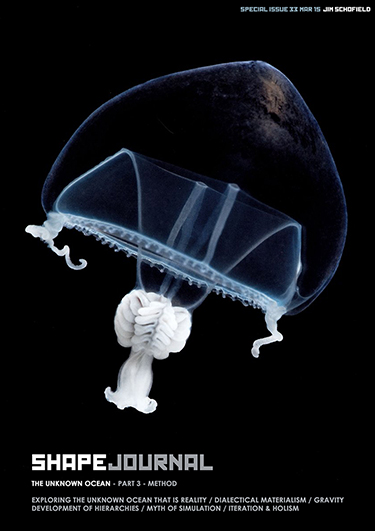
The Team
Jim Schofield - Editor
Physicist, Philosopher, Marxist, Multimedia Expert, Mathematician, Author, Sculptor.
Dr. Peter Mothersole - Editor
Senior Lecturer in Computing, Physicist, Photographer, Constructivist, Software Developer, Philosopher.
Mick Schofield - Art Director
Graphic Designer, Writer, Photographer, Music Producer,
Digital Artist, Webmaster |
|
|
|
SHAPE Special Issue 33
The Unknown Ocean III
Method
1. Introduction
2. Dialectical Materialism
3. Couder’s Motivations
4. Hitting the Buffers
5. Development via Hierarchies
6. Inner Pavings Too?
7. The Myth of Simulation
8. Iteration & Holism
Read PDF (Right click link to Download)
Comment on this Issue
Editorial
Welcome to the third part of our Unknown Ocean series and the 33rd Special Issue of the SHAPE Journal. Here we will continue our journey deeper into the uncharted depths of reality, this time concentrating on the necessary methodology.
A major threshold lies before Mankind, which so far scientists have refused to address, and hence never resolved, and, instead they have continued with the old views and methods, which are incapable of transcending this evident impasse. We are stuck and can go no further.
Now, of course, many of the aspects of this new view have been glimpsed upon many occasions by remarkable investigators, but their brilliant contributions have not managed to transform the standpoint or the methodology of the majority of serious investigators. They remain steadfastly committed to both Positivism and Pluralism. And, though, in most involved individuals, both mysticism and religion have long been banished from their standpoint, those alone did not, and indeed could not, deliver the necessary breakthrough that will facilitate the next steps forward. In all the main intellectual disciplines the old assumptions are still well entrenched, underpinning both Modern Science and Philosophy.
In the 21st century, crucial scientific researches are weighed down with these abstractions, constructions, assumptions and principles of a now significantly failing past intellectual stance. For these are no longer worthy of delivering a productive and developing standpoint, essential at this time to produce any real progress at all. Science has run out of steam. Since 1927 Physics has only moved backwards towards an even more defunct idealist standpoint.
Yet, the way forward has been, at least, indicated, for the last 2,500 years with both the Holism of the Buddha in India, and the scepticism of Zeno of Elea.In spite of a long period of stagnation, philosophically, finally, only 200 years ago, Frederick Hegel, in his main philosophical undertaking, revealed the inadequacies of our concepts, and why they were inevitably so. But, of course, Hegel was an idealist (an obvious disadvantage in his own primary objective of unifying Philosophy with Science) so that, not even his leading disciples, namely Karl Marx and Frederick Engels, saw that Hegel’s gains in the area of Human thinking just had to be re-established within the alternative, materialist philosophical outlook, and, of course, intimately wedded to Science. But, that just hasn’t happened!
Despite brilliant contributions by scientists like Darwin and Wallace, and the major gains in Philosophy made by Marx, the necessary re-construction of a consequent philosophy among scientists did not occur. And, that has been a major problem.
Now, the situation is beginning to change, as this writer, and many others worldwide, begin to question the impasses and anomalies proliferating in all areas of Modern Science, and are endeavouring to construct a new, and sounder basis, and this series of Specials deliver some suggested steps in an advancing a wholly new understanding upon a, so far, unimplemented standpoint in Science and in Philosophy together.
It is, of course, a presumptive claim, so he has broken the argument down into three Special Issues of this journal, of which this is the final instalment
Jim Schofield
MAR 2015
|
|
|




